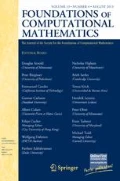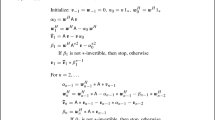Abstract
In this paper we develop in a systematic manner the theory of time-stepping methods based on the Cayley transform. Such methods can be applied to discretize differential equations that evolve in some Lie groups, in particular in the orthogonal group and the symplectic group. Unlike many other Lie-group solvers, they do not require the evaluation of matrix exponentials. Similarly to the theory of Magnus expansions in [13], we identify terms in a Cayley expansion with rooted trees, which can be constructed recursively. Each such term is an integral over a polytope but all such integrals can be evaluated to high order by using special quadrature formulas similar to the construction in [13]. Truncated Cayley expansions (with exact integrals) need not be time-symmetric, hence the method does not display the usual advantages associated with time symmetry, e.g., even order of approximation. However, time symmetry (with its attendant benefits) is attained when exact integrals are replaced by certain quadrature formulas.




